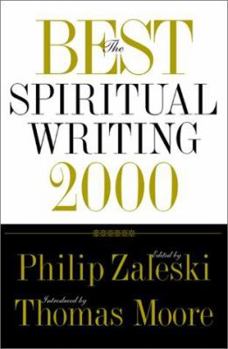The Best Spiritual Writing 2000
(Part of the The Best Spiritual Writing Series)
The acclaimed anthology series that Publishers Weekly's starred review called 'a significant addition to the spiritual literature of our time' returns with the year's outstanding prose and poetry on... This description may be from another edition of this product.
Format:Paperback
Language:English
ISBN:0062516701
ISBN13:9780062516701
Release Date:September 2000
Publisher:HarperOne
Length:384 Pages
Weight:0.75 lbs.
Dimensions:0.9" x 5.3" x 8.0"
Customer Reviews
2 ratings
A BEAUTIFULLY CRAFTED COLLECTION
Published by Thriftbooks.com User , 23 years ago
This is a beautifully crafted collection of spiritual writing, comparable to looking at a finely woven piece of sacred tapestry. Writers Kimberly Snow, "Rearranging the Clouds", John Updike, "Religious Consolation", James Van Tholen, "Surprised by Death", Jacques Lusseyran, "What One Sees Without Eyes", Natalie Goldberg, "The Rain and the Temple", and Ann Hood, "In Search of Miracles", are among those selected by Philip Zaleski and a panel of distinguished writers and thinkers to perpetuate this ongoing series of books honoring great spiritual writers. The aim of the 2000 series was to capture the spiritual pulse of this century, not of the earlier ones. More than two hundred books were nominated by the panel. This collection represents a wide spectrum of religious traditions. I liked that it embraced the everyday aspects of spirituality in our lives. Highly recommended reading! Hopefully, the 2001 series will include James Davis, "Rosetta Stone of God", Philip Morimitsu, "The Seeker", or Harold Klemp, "Child In The Wilderness".These three authors offer similar stunning insights and soul searing reminders of our ability to connect with Divine Spirit daily.
Good soul food.
Published by Thriftbooks.com User , 24 years ago
In his Preface to this collection of forty essays and poems, Zaleski writes, "we see that certain themes remain constant" in the Best Spritual Writing series, "as if hard-wired into the soul: the struggle with evil; the quest for God; nature as the ophany; the sense that we inhabit two worlds, one divine, the other human--all too human" (p. xvi). Although I found his five-star, 1999 collection more compelling overall, the contributions here both stir the soul and move the mind. Or, in the words of Thomas Moore's Introduction, these writings "should help us get through life rather than above or around it, . . . should turn us inside out, peeling back our skin of literalism, and remind us to hear the divine and angelic music that sounds through in any good piece of writing" (p. xviii). This collection takes us on spiritual journeys both literally and figuratively. With her "rucksack on a cold March morning," Gretel Ehrlich follows the 800-year-old footsteps of St. Francis, "wanderer, seeker, ultimately saint" (p. 101). On her pilgrimage, she discovers "walking and giving, walking and singing, walking and praying: the path was a proving ground for sainthood, and walking was ambulation for heart and mind" (p. 107). We also travel with Natalie Goldberg to Kitada, Japan, where she visits the grave of her Zen teacher, Katagiri Roshiin a downpour. She writes, "I prostrate three times on the wet earth and I kneel in front of his stone. Pushing the dripping hair from my face, the rain running down my cheeks, I speak to my teacher: 'I am here. It took me a while, but I made it'" (p.139). Through the death of his wife, Christopher Bamford discovers the meaning of life, that "each person's life is a spiritual journey" (p. 8), and that "time, each moment" is" a gift, a grace" (p. 4). Anita Mathias learns that "domesticity, marriage, and motherhood are smiths in which the soul can be forged as painfully, as beautifully, as amid the splendid virginal solitudes of the convent" (p. 218). In the most humourous essay in the book, John Price describes his near-death experience with a pheasant while driving through Iowa. "It made me wake up, become more observant of what's lurking in the margins," he writes. "What's lurking there, despite the rumors, is the possibility of surprise, of accident, of death. And if it's possible in this over determined landscape for a pheasant to kill a man, then why not, too, the possibility of restoration, renewal, and, at last, hope?" (p. 264). I was pleased to find several of my favorite writers here, and discovered a few new writers I am eager to read beyond this anthology. While Wendell Berry questions "the hopeless paradox of making peace by making war"(p. 37), Annie Dillard finds "sparks of holiness" in the depths of "our bleak world" (p. 86). In her essay (excerpted from her excellent book, FOR THE TIME BEING), she observes, God "does not give as the world gives; he leads invisibly over many years, or he wall






